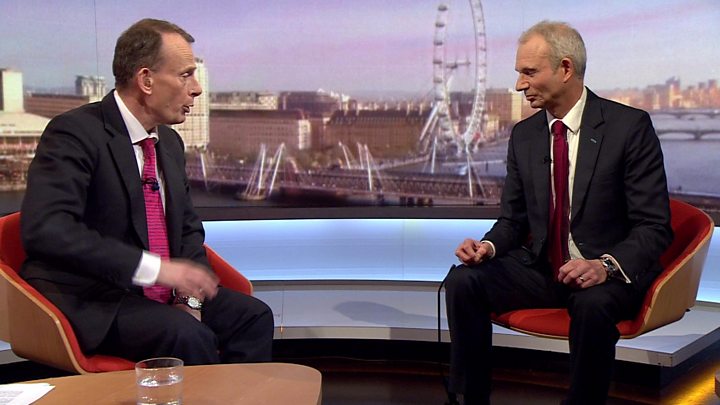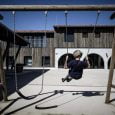
Conservatives must “come together in a spirit of mutual respect”, a cabinet minister has said amid a row over Brexit negotiations.
David Lidington told the BBC the “left, right and centre” of the party should look at the “bigger picture”.
It comes as former cabinet minister Theresa Villiers warned Brexit could be “diluted”.
She is among Eurosceptics concerned that the UK will remain in the EU “in all but name”.
The UK is due to leave the European Union in March 2019, and among the key questions in negotiations between the two sides is how close their trading relationship will be in the future.
Chancellor Philip Hammond’s remarks at the World Economic Forum at Davos that changes to UK-EU relations could be “very modest” prompted criticism from several Tory backbenchers, with one saying the chancellor should “stick to the script” laid out by the prime minister.
- Trump ‘would’ve done Brexit differently’
- Laura Kuenssberg: Tories’ Brexit agonies resurface
- Davis plays down Tory Brexit row
- Rees-Mogg and Hammond at odds over Brexit
But Mr Lidington told The Andrew Marr Show: “I think what I say to all my colleagues is the Conservative family – left, right and centre, because we’re a broad church – needs to come together in a spirit of mutual respect, there are differences in any broad church, and look at what the bigger picture is showing.”
The party was still “neck and neck” with Labour in the polls after eight years of government, as well as “taking seats off them” in local government elections, he added.
‘Respect result’
Ms Villiers, who campaigned for the UK to leave the EU in the 2016 referendum, wrote in the Sunday Telegraph, that there was “a real danger” the UK would sign up to an agreement with Brussels which could “keep us in the EU in all but name”.
The former Northern Ireland secretary told the BBC’s Sunday Politics: “There is only so far you can go with compromise without ultimately finding yourself in a position where you’re selling out all the people who voted to leave.”
Ms Villiers is the latest senior Conservative Eurosceptic to speak out over perceived backsliding by the government.
Earlier in the week, MP Jacob Rees-Mogg, one of the leading Eurosceptic voices on the Conservative benches, said that “close alignment” with the EU after Brexit would be unacceptable.
And other Conservatives have voiced concerns about the direction of Downing Street on domestic issues.
Robert Halfon, chair of the education select committee, told BBC Radio 4’s World This Weekend: “We need to have less policy making by tortoise and [more] policy making by lion.
“Because we have to be radical. We have to stop seeing politics in transactional terms.”
‘Power’ to diverge
Although 29 March 2019 is the official Brexit date, the UK will continue to allow free movement of people, goods and money for about two years to allow businesses to adjust.
The EU is seeking to tighten the conditions which will apply to the UK during the transitional period, according to a draft of revised EU guidelines.
Mr Lidington told the BBC that there would be “big, big differences” to the relationship during that period, and that Britain would have the option to move away from EU rules.
“The bill in front of Parliament extinguishes the power of the European Court (of Justice) and supranational EU law over the UK.
“We will have, from next year, a registration system we’ve not had before for EU nationals coming to this country.
“Of course we will have the power to choose for ourselves whether or not to diverge once we have left the supranational legal structures of the EU,” he added.
Meanwhile, former Tory party chairman Grant Shapps has urged the prime minister to “name a date” when she will stand down, according to the Mail on Sunday.
Mr Shapps said he had not submitted a letter to the party’s 1922 Committee, calling for a leadership contest, but added “an increasing number of my colleagues have”.
Elsewhere, in an interview with Piers Morgan for ITV, US President Donald Trump criticised the prime minister’s approach to Brexit negotiations.
He says he would have “taken a tougher stand in getting out”.
source:-BBC



